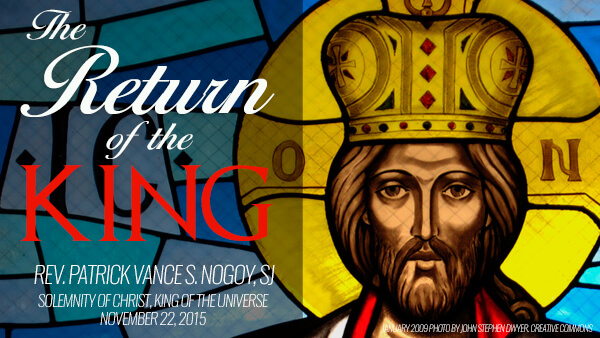


Rev. Patrick Vance S. Nogoy, SJ
Solemnity of Christ, King of the Universe
November 22, 2015
Tracing its roots from Israelite culture, the kingly line is quite opposite of how we ordinarily view kings. Kingship in Israel follows the transition from the Judges, where Samuel, the last of the Judges and the first among the prophets, was asked by God and people to anoint a king to rule over them. Curiously, the early Israelite kings were anointed by prophets, chosen by God, to represent Him and govern his people. God serves as king and ruler of His people, taking decisive action in behalf of Israel (evidence of which is the Exodus experience). Now in Samuel’s time, He granted Israel’s request for a king. The king, therefore, serves as a mediator between God and people, ensuring the people’s obedience to God’s covenant and making present God’s merciful and loving rule. There were instances too that the king also led the community in worship as in the case of King David when he danced wantonly in front of the Ark of the Covenant, praising God and of King Solomon when he offered sacrifices to the Lord in the completion of the Temple. It was not abnormal, in Israel worldview, to see the king as God’s adopted son: mediator, priest, and ruler. The king, in Israel’s history, is the servant of God and people.
However, kings proved to be fallible and frail. Throughout the history of Israel and Judah leading to the exile, kings reneged in their commitment both to God and people. Despite the stern guidance of the prophets, Israel and Judah fell into exile because their kings were disobedient. Falling from grace, the king’s honor was but a fragile and beautiful memory in Jesus’ time. They longed for the time of David, hoping for a Messiah from David’s line where kings were once mediator, priest, and ruler—a true servant of God and people.
In the classic confrontation between Jesus and Pilate, the idea of Israelite king comes to fore. Jesus is a different king. Unlike the kings of the past, despite His heavenly origin, He chose to sacrifice Himself, living among us, being faithful to God and His mission. As the old Christian hymn in Paul’s letter to the Philippians go, Jesus did not deem equality with God, something to be grasped at. Rather, He emptied Himself taking the form of slave by becoming man and was obedient even unto death. In Christ’s life, He restored the true essence of king: fidelity to God and people.
“For this I was born and for this I came into the world, to testify to the truth.” Pilate was in front of a returning Israelite king. This time, His kingdom is not defined by this world but by God’s truth. This is the truth of God’s love, active and aching to heal and restore a broken creation. In fidelity to His mission, Jesus restores the dignity and honor of the king and elevates it in His sacrifice on the cross. Israel could only conceive of a king as a powerful ruler and servant but Jesus showed there is more power in powerlessness: that true kings are ones who are able to offer and sacrifice their lives for the sake of their people.
In the world filled with hate, corruption, politics, we can hardly find a good leader. We can only dream of rulers, governors, presidents, or kings wisely governing us. Some remain content with the lot we have and sigh for the lost hopes and dreams for a more just and peaceful world. Here our eyes are led to contemplate Jesus the King: Mediator. Priest. Ruler. But most of all, a faithful servant of God and people. And Christ is never selfish. Those who belong to him He empowers to be like Him, sharing in His mission of restoring God’s kingdom in loving compassion. Gazing upon Him on the cross, we are moved as in the Spiritual Exercises of St. Ignatius: What have I done? What am I doing? What will I do for Christ?